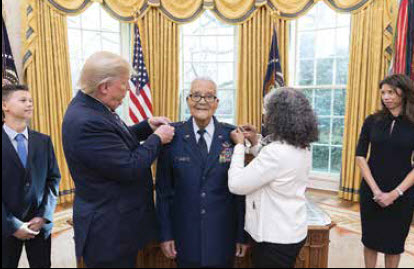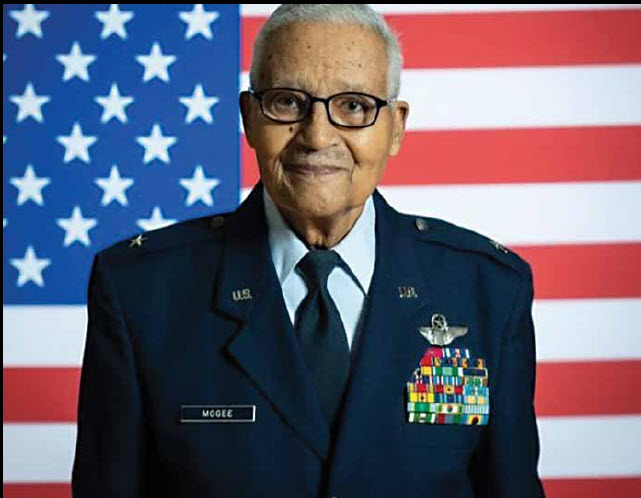 By: Ali Elizabeth Turner
By: Ali Elizabeth Turner
Brigadier General Charles McGee, one of the original Tuskegee Airmen has just “flown his last flight.” On January 16, he passed away peacefully in his bed, and was found with his hand on his heart and a smile on his face. I will never forget the night he was promoted at the State of the Union Address by then-President Trump to the rank he so greatly deserved. The place went wild, and the grand old man, who flew more than 409 missions from WWII to Vietnam saluted his CNC and smiled a humble grin that was totally endearing. He had turned 100 years old just the month before, and on the day of the address, the president pinned his stars on his lapels in a ceremony in the Oval Office. He looked smart in his Air Force dress blues, and was flanked by his great-grandson, Iain Lamphier. Iain has always dreamed of going into space, wants to attend the Air Force Academy, has his eye on joining the Space Force, and was honored alongside his great-grandfather. President Trump quoted Iain as saying, “Most people want to look up at space; I want to look down on the world.”
General McGee left an extensive progeny, including great-great grandchildren, and a lasting legacy. While candid about the racism he encountered as he served our country, he also refused to be a victim. When he would speak, he talked about his secrets to success, which he referred to as the 4 Ps—Perceive, Prepare, Perform, and Persevere. “I grew up learning that you treated others like you wanted to be treated.” The general was one who did not tolerate self-pity or victimization. He would tell other military pilots and service members, “Don’t let the circumstances be an excuse for not achieving.”

It especially affected me that Charles McGee spoke of maintaining patriotism in the face of racism. “We could have gone off in the corner with our head bowed—that’s not the American Way,” he adjoined. As part of his centenarian celebration, Charles was invited to fly a plane dripping with technology that had not even been dreamed of in 1942 when he joined the Tuskegee Airmen. When the Japanese attacked Pearl Harbor, they did so on Charles’ 22nd birthday. At the time, he was studying at the University of Illinois at Champaign Urbana. His major was engineering, and he also drilled with the ROTC and the Pershing Rifles.
Charles was the son of an African Methodist Episcopal minister by the name of Lewis Allen, who served as a chaplain in WWI and also at the Battle of the Bulge in WWII. His grandfather was a slave. The countless times that he was asked what it was like to fight for a country that at the time of the beginning of his service was segregated, he would say with trademark modesty, “Well, fortunately, I didn’t think about that, that much.” I think it’s safe to say that now he doesn’t have to think of it at all. Rest in peace, Sir, and thank you from all Americans for your exemplary spirit and service.
By: Ali Elizabeth Turner










 June 20, 2025
June 20, 2025



